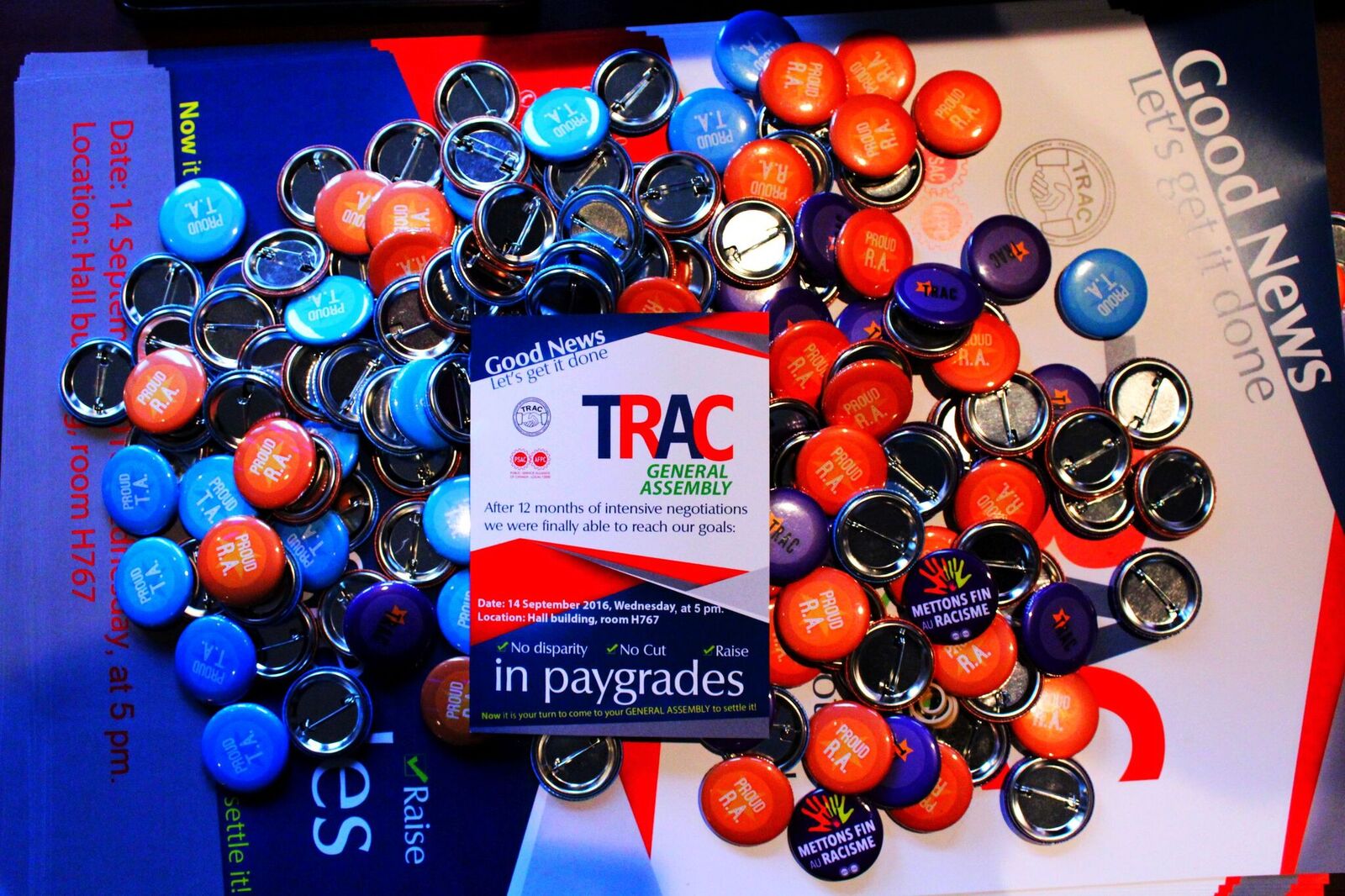Members vote for equal pay for all levels of study—TAs and RAs allotted a 1 per cent raise
Teaching and Research Assistants of Concordia University (TRAC) voted for equal pay grades for teaching assistants (TAs) and research assistants (RAs) at all levels of study at their general assembly held on Sept. 14.
Before the voting began, TRAC President Nader Jafari Nodoushan discussed that if TRAC members—being TAs, RAs and invigilators—were to vote to ratify a new pay grade structure, it would be implemented for both TA’s and RA’s, resulting in an increase to both of their minimum pay grades by one per cent. Jafari Nodoushan said TA pay grades in all faculties would be an equal pay rate of $24.93 per hour, while markers pay rate would rise to $20.21, regardless of faculty or level of study. Jafari Nodoushan said someone who marks work qualifies as a marker, however, someone that does anything more qualifies as a TA.
Previously, the pay rates varied from faculty and level of study.
Following the meeting, Jafari Nodoushan told The Concordian markers at Concordia are receiving the highest pay rate for a university marker in Quebec, while TAs are being paid the second highest. “All other universities [in Quebec] except McGill have lower pay grades [for TAs] than Concordia University,” said Jafari Nodoushan. He stressed the fact that a time sheet created by TRAC will ensure members will be paid properly for the hours they worked.
Robert Sonin, former TRAC president and a current member of the organization due to his work as an invigilator, claims TRAC is disorganized—he said they didn’t release the agreement prior to the general meeting.
He said members were not given the actual agreement at the event, only a summary which did not allow them enough time to assess the agreement.
“That paper they got, it’s not what they signed. It’s just an explanation of what they signed,” Sonin said.
Sonin said he believes that, as a result of higher pay rates, the hours allotted to TAs will be reduced. “Concordia will do what it has to do to keep within its budget,” said Sonin. “If you have a limited budget to pay for TA hours and the price goes up, you can afford fewer hours.”
When asked if pay raises could result in hour cuts, Jafari Nodoushan said it is hard to say whether hours will be cut.
“Our members are receiving the difference between the new pay structure and also the old pay structure in the summer—we have the numbers, and it’s showing that there hasn’t been any cut on the hours,” said Jafari Nodoushan. This means members will have their pay compensated from the hours they worked in the summer to be paid the new raise that was voted after the general assembly. “It can’t be said easily that Concordia will cut the hours because the pay grade is increasing,” he said.
When asked if Concordia is increasing their budget towards TAs and RAs this academic year, Jafari Nodoushan said not all the contracts had been paid in full. “We don’t have the exact numbers of how much the TA budget has been increased in the summer.” He said it would be released in Concordia’s financial report.
Regarding the budget allotted to TAs and RAs this academic year, Concordia University spokesperson Chris Mota said, “the agreement in principle hasn’t been approved by the board yet, so there is no number available to share at this point, making a comparison impossible.”
Jafari Nodoushan believes the pay raises will result in more equal payment for members, because pays will no longer vary between department and level of study—undergraduates were previously being paid less than graduate students. “Equity is to treat all the labourers in an equally bound way, not to hire cheaper labourers or make them overloaded because they are cheaper labourers,” he said.
Jafari Nodoushan said he believed this new pay rate would not result in graduates being picked over undergraduates, now that they have equal pay. “As far as I know, many professors prefer to have undergrad students hired, especially those in the third or fourth year of their bachelor [degree], to get more experience.” he said. “I believe this intention will remain.”
Last April, Sonin filed a complaint against TRAC to Quebec’s branch of the national labour union Public Service Alliance of Canada. Sonin had requested access to financial history due to a discrepancy of $16,348.93 in financial reports. Being a member, he was entitled to these documents. However, he was only allowed to view an Excel spreadsheet, being refused access to financial documents and receipts.
When The Concordian asked Jafari Nodoushan if he had an update regarding the discrepancy we reported on in April 2016, he said that a follow-up will not be released until later. “We are in the process of an investigation and it needs to be done first,” Jafari Nodoushan said. “After we will be able to release all the results.”
